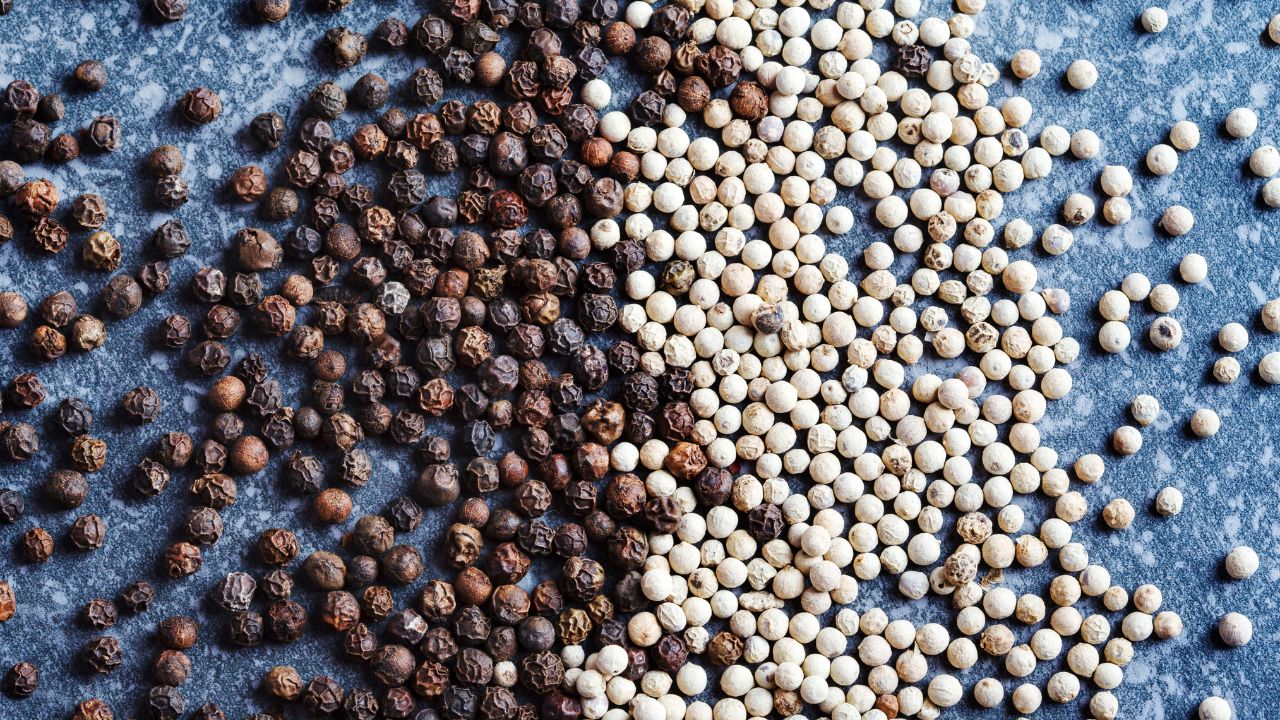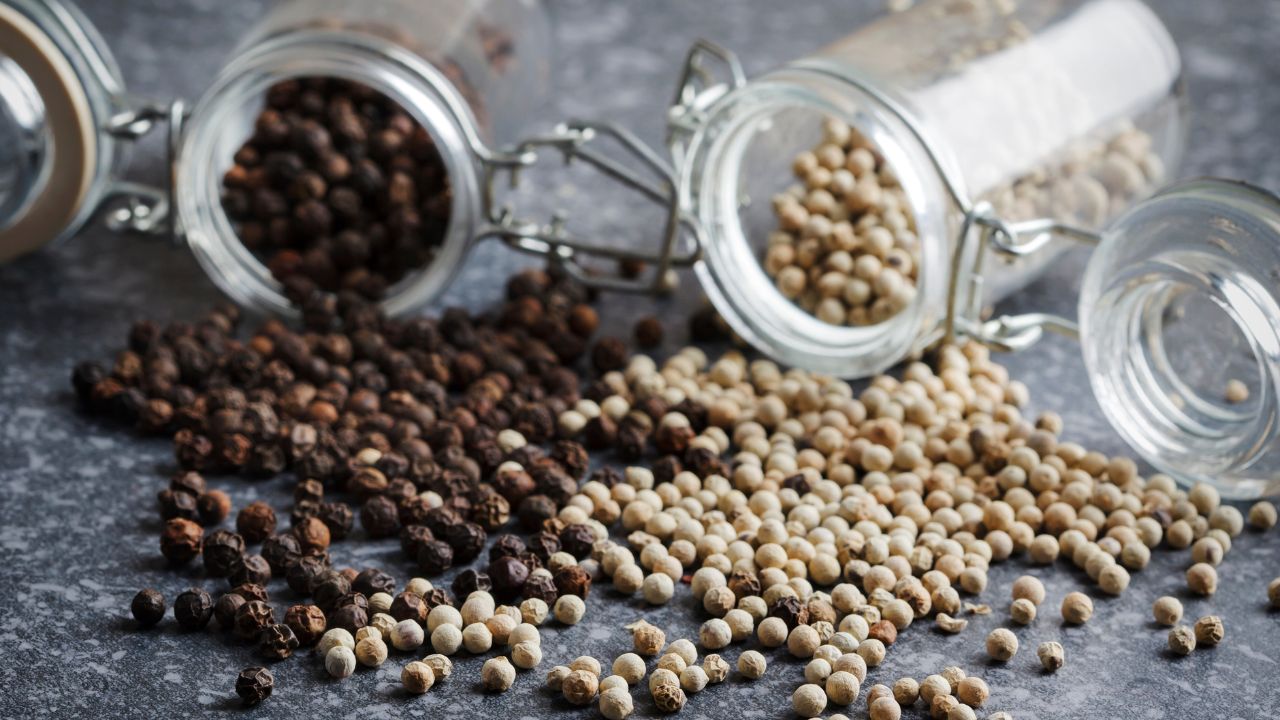Almost everyone who has cooked even a little bit knows how much of a staple pepper is in almost any spice rack and how many dishes it improves just by adding it. This seasoning is super accessible and almost everyone has it in their home.
It is known for having a sharp and spicy taste with an earthy aroma which compliments a surprisingly high number of dishes and brings them to the next level when used properly.
Something fewer chefs know however, is that there are actually different types of pepper available, and these different varieties have different characteristics which make them better in different scenarios.
While there are quite a few different varieties of pepper, this article will be covering the two most common types; white pepper and black pepper.

While black pepper is generally considered the more common of the pair, both are quite widely used, and many interpret their similar name as them being interchangeable in cooking.
However, this article is going to cover what makes these two spices different from each other.
We will go over their different tastes and flavors, what they are used in and what dishes they are both used in, how long they last, and much more.
So if you own both black and white pepper, but you have never considered what the differences between the two are, and you want to ensure that you are using them both correctly, this guide is here to help you out!
What Is The Main Difference Between White Pepper And Black Pepper?
Of course, as the name suggests, the most clear difference between white pepper and black pepper is their appearance. But why is that black pepper is black, and why is white pepper white?
It is interesting to note that while both of these varieties of pepper look quite different, they actually come from the same original plant called piper nigrum.
The berries which are gotten from this plant are called peppercorns. When these peppercorns grow they will start with a green color, but this will turn black or white depending on how they will be processed.
When it comes to black pepper, this will tend to be a more cheap and common option. This is partially because it comes from unripe, but close to ripe berries.
Once they have been picked they will subsequently be dried in the sun between 6 and 8 days. This is what turns them black and gives them their distinct complex and strong flavor.
Unlike black pepper, white pepper will be made from fully ripe peppercorns. Once these berries have been harvested, they will then be soaked in water, which will take somewhere between 10 and 12 days. This is done to soften the peppercorn as well as remove its outer layer.
The farmers will use a continuous source of flowing water which will encourage the removal of the peppercorns skin. By continuously soaking as well as fermenting the pepper it will have a distinct flavor for the eventual white pepper.
What Is Spicier? White Pepper Or Black Pepper?
While both types of pepper are made using the same plant, they will be processed in different ways which will give them a unique flavor.
When it comes to gauging the spiciness of the two types of pepper, white pepper clearly has a bit more heat when compared to black pepper, this is by no means intended to imply that black pepper has less flavor, however.
When referring to culinary experts, they all consider that while black pepper is generally less spicy than white pepper is, it does in fact have a more strong flavor which is seen as more complex.
This is due to the outer blackened layer of the black pepper which has gone through drying and preservation. This step in its production will add compounds into the pepper giving it more flavor as well as earthy and fruity tones.

Can You Substitute White Pepper And Black Pepper For Each Other?
One of the most common questions people have when it comes to discussing black pepper and white pepper, is whether they will work as substitutes of each other, or maybe if one works as a substitute, while the other does not.
The answer to this is that in some cases, you can fully use these different types of pepper interchangeably, however, this is not always the case and some things should be kept in mind.
As most cooks know, black pepper is a lot more commonly used than white pepper. White pepper mostly finds its use in dishes where you do not want to have the clearly visible darker specks which are left by using black pepper.
A common place you will find white pepper is in many Asian sauces and soups.
If you are choosing to substitute one for the other, you will want to consider the amount which is required for the recipe which you are following. For example, if your recipe is asking for a small amount of pepper, whichever type, you can easily substitute one for the other.
This is because the substitution will not be having a very noticeable effect on the outcome of your dish, for example dark specks or not dark specks.
But if your recipe is asking for a much more significant amount of pepper, you should avoid substituting. This is because the differences between the required type of pepper, and the one which you ended up using will be very noticeable as they will be impacting the flavor of the disk drastically.
The subtle differences in flavor complexity, heat level, and aroma, will be very easy to spot, and the flavor of the dish itself will be shifted.
So to summarize, if the recipe just needs a little white or black pepper, feel free to switch them. But if the white or black pepper is a significant part of the recipe and uses quite a high quantity, you should try and find the type which is needed instead of substituting.
It is also worth noting that since white pepper is significantly more hot than black pepper, then if you are planning to use black as a substitution for white, you may want to add more black pepper than the quantity specified to make up for the heat which you will be lacking.
Sometimes even adding different complimentary spices would be useful if you are trying to match the taste.
Another facet of white pepper worth noting is that it becomes quite bitter if you end up overheating it. This is why you will find that it tends to be added to a recipe much later than its counterpart, unless of course, you are trying to achieve this bitterness.
A final consideration worth making in this section is that in almost all places, white pepper will cost more than black pepper does. This is due to the process of producing white pepper requiring much more effort than the process of producing black pepper.
What Lasts Longer? White Pepper Or Black Pepper?
A good thing about keeping both of these types of pepper in stock is that they will never go bad or be unusable due to how dried out they are in the production process.
However, while this is the case, after time, they will slowly lose their aroma, as well as their flavor getting slightly dulled.
While this happens to both types of pepper, it happens to black pepper significantly more slowly than it does for white pepper.
And also when you are choosing what kind of pepper to by, it is worth remembering that both types of pepper will retain their qualities for longer if you are buying the whole peppercorns instead of a ground powder.
This is why you tend to find pepper in grinders which will freshly grind your pepper, but it is cheaper often to get it pre ground.
Since white pepper is more expensive though, getting peppercorns is a great way to preserve its flavor.
A whole black peppercorn will keep its full flavor for about 2 years while a white peppercorn will stay this way for several months, maybe a year if kept stored in an airtight space.
To keep them fresh as long as possible store them in an airtight container and at room temperature.
Conclusion
Hopefully this guide has given you all the information you need about the differences between white pepper and black pepper to help inform you on when to use which one.
This guide has explained the different ways each of these types of pepper are produced even though they come from the same plant.
We have also gone over the unique flavors which each of these types of pepper have and how this influences whether or not they should be substituted for each other.
- 15 Traditional Greek Breads - July 31, 2023
- 30 Delicious And Gluten-Free Cookie Recipes - July 29, 2023
- 30 Of The Best European Desserts - July 29, 2023
